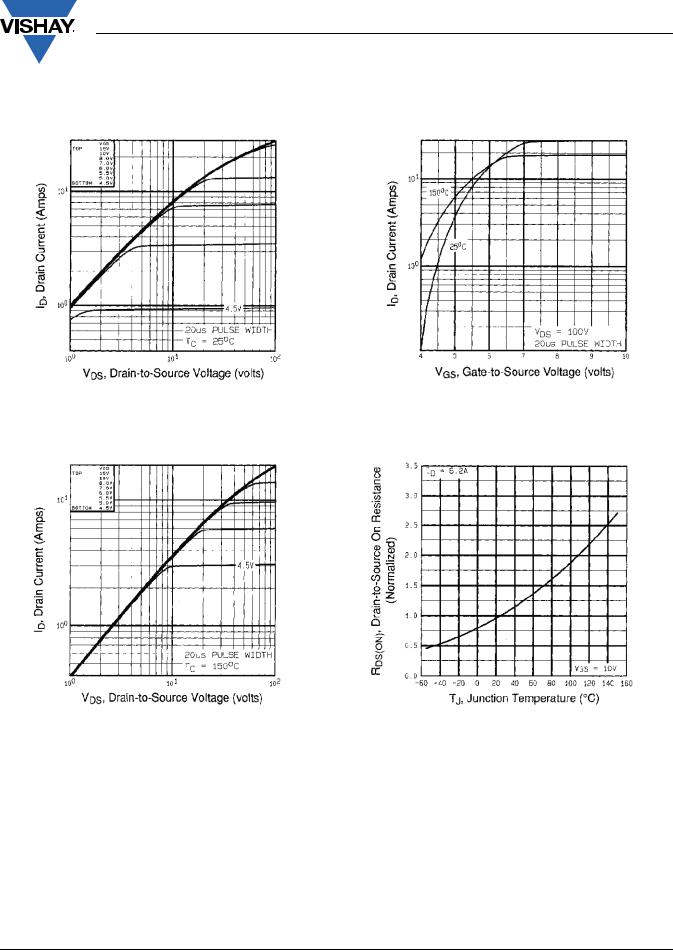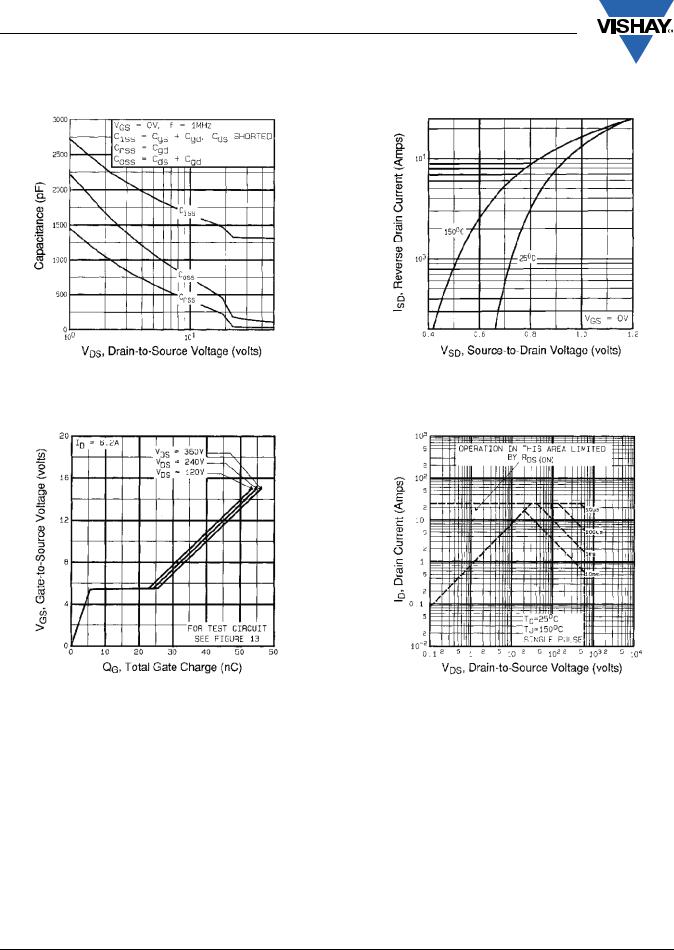Vishay IRFBC40S, SiHFBC40S, IRFBC40L, SiHFBC40L Data Sheet

IRFBC40S, SiHFBC40S, IRFBC40L, SiHFBC40L
Vishay Siliconix
Power MOSFET
PRODUCT SUMMARY
VDS (V) |
|
600 |
|
RDS(on) ( ) |
VGS = 10 V |
|
1.2 |
Qg (Max.) (nC) |
|
60 |
|
Qgs (nC) |
|
8.3 |
|
Qgd (nC) |
|
30 |
|
Configuration |
|
Single |
|
|
|
|
|
D
I2PAK (TO-262) |
|
D2PAK (TO-263) |
|
|
G |
|
|
G |
|
D S |
D |
G |
S |
|
|
S |
|
|
|
|
|
|
N-Channel MOSFET |
FEATURES
• Halogen-free According to IEC 61249-2-21 Definition
• Surface Mount (IRFBC40S, SiHFBC40S)
• Low-Profile Through-Hole (IRFBC40L, SiHFBC40L)
• Available in Tape and Reel (IRFBC40S, SiHFBC40S)
• Dynamic dV/dt Rating
•150 °C Operating Temperature
•Fast Switching
•Fully Avalanche Rated
•Compliant to RoHS Directive 2002/95/EC
DESCRIPTION
Third generation Power MOSFETs from Vishay provide the designer with the best combination of fast switching, ruggedized device design, low on-resistance and cost-effectiveness.
The D2PAK is a surface mount power package capable of the accommodating die sizes up to HEX-4. It provides the highest power capability and the lowest possible on-resistance in any existing surface mount package. The D2PAK is suitable for high current applications because of its low internal connection resistance and can dissipate up to 2.0 W in a typical surface mount application. The through-hole version (IRFBC40L, SiHFBC40L) is available for low-profile applications.
ORDERING INFORMATION |
|
|
|
|
|
|
|
|
|||
Package |
|
D2PAK (TO-263) |
|
|
|
D2PAK (TO-263) |
I2PAK (TO-262) |
|
|||
Lead (Pb)-free and Halogen-free |
|
SiHFBC40S-GE3 |
|
|
|
SiHFBC40STRL-GE3a |
SiHFBC40L-GE3 |
|
|||
Lead (Pb)-free |
|
IRFBC40SPbF |
|
|
|
IRFBC40STRLPbFa |
IRFBC40LPbF |
|
|||
|
SiHFBC40S-E3 |
|
|
|
SiHFBC40STL-E3a |
SiHFBC40L-E3 |
|
||||
|
|
|
|
|
|
||||||
Note |
|
|
|
|
|
|
|
|
|
|
|
a. See device orientation. |
|
|
|
|
|
|
|
|
|
|
|
|
|
|
|
|
|
|
|||||
ABSOLUTE MAXIMUM RATINGS (TC = 25 °C, unless otherwise noted) |
|
|
|||||||||
PARAMETER |
|
|
|
|
|
|
SYMBOL |
|
LIMIT |
UNIT |
|
|
|
|
|
|
|
|
|
|
|
|
|
Drain-Source Voltagee |
|
|
|
|
|
|
VDS |
|
600 |
V |
|
Gate-Source Voltagee |
|
|
|
|
|
|
VGS |
|
± 20 |
||
|
|
|
|
|
|
|
|
||||
Continuous Drain Current |
|
|
VGS at 10 V |
TC = 25 °C |
ID |
|
6.2 |
|
|||
|
|
TC |
= 100 °C |
|
3.9 |
A |
|||||
|
|
|
|
|
|
|
|||||
Pulsed Drain Currenta,e |
|
|
|
|
|
|
IDM |
|
25 |
|
|
Linear Derating Factor |
|
|
|
|
|
|
|
|
1.0 |
W/°C |
|
Single Pulse Avalanche Energyb, e |
|
|
|
|
|
|
EAS |
|
570 |
mJ |
|
Repetitive Avalanche Currenta |
|
|
|
|
|
|
IAR |
|
6.2 |
A |
|
Repetitive Avalanche Energya |
|
|
|
|
|
|
EAR |
|
13 |
mJ |
|
Maximum Power Dissipation |
|
|
TC = 25 °C |
PD |
|
130 |
W |
||||
|
|
TA = 25 °C |
|
3.1 |
|||||||
|
|
|
|
|
|
|
|||||
Peak Diode Recovery dV/dtc, e |
|
|
|
|
|
|
dV/dt |
|
3.0 |
V/ns |
|
Operating Junction and Storage Temperature Range |
|
|
|
|
TJ, Tstg |
|
- 55 to + 150 |
°C |
|||
Soldering Recommendations (Peak Temperature) |
|
for 10 s |
|
|
|
300d |
|||||
|
|
|
|
|
|||||||
Notes
a.Repetitive rating; pulse width limited by maximum junction temperature (see fig. 11).
b.VDD = 50 V; starting TJ = 25 °C, L = 27 mH, Rg = 25 , IAS = 6.2 A (see fig. 12).
c.ISD 6.2 A, dI/dt 80 A/μs, VDD VDS, TJ 150 °C.
d.1.6 mm from case.
e.Uses IRFBC40, SiHFBC40 data and test conditions.
* Pb containing terminations are not RoHS compliant, exemptions may apply
Document Number: 91116 |
www.vishay.com |
S11-1053-Rev. C, 30-May-11 |
1 |
This document is subject to change without notice.
THE PRODUCTS DESCRIBED HEREIN AND THIS DOCUMENT ARE SUBJECT TO SPECIFIC DISCLAIMERS, SET FORTH AT www.vishay.com/doc?91000

IRFBC40S, SiHFBC40S, IRFBC40L, SiHFBC40L
Vishay Siliconix
THERMAL RESISTANCE RATINGS
PARAMETER |
SYMBOL |
TYP. |
MAX. |
UNIT |
|
|
|
|
|
Maximum Junction-to-Ambient |
RthJA |
- |
40 |
|
(PCB Mounted, steady-state)a |
°C/W |
|||
Maximum Junction-to-Case |
RthJC |
- |
1.0 |
|
Note
a. When mounted on 1" square PCB ( FR-4 or G-10 material).
SPECIFICATIONS (TJ = 25 °C, unless otherwise noted)
PARAMETER |
|
SYMBOL |
TEST CONDITIONS |
MIN. |
TYP. |
MAX. |
UNIT |
||||||||
|
|
|
|
|
|
|
|
|
|
|
|
|
|
|
|
Static |
|
|
|
|
|
|
|
|
|
|
|
|
|
|
|
Drain-Source Breakdown Voltage |
|
VDS |
VGS = 0, ID = 250 μA |
600 |
- |
- |
V |
||||||||
VDS Temperature Coefficient |
|
VDS/TJ |
Reference to 25 °C, ID = 1 mA |
- |
0.70 |
- |
V/°C |
||||||||
Gate-Source Threshold Voltage |
|
VGS(th) |
VDS = VGS, ID = 250 μA |
2.0 |
- |
4.0 |
V |
||||||||
Gate-Source Leakage |
|
IGSS |
|
VGS = ± 20 V |
- |
- |
± 100 |
nA |
|||||||
Zero Gate Voltage Drain Current |
|
IDSS |
VDS = 600 V, VGS = 0 V |
- |
- |
100 |
μA |
||||||||
|
VDS = 480 V, VGS = 0 V, TJ = 125 °C |
- |
- |
500 |
|||||||||||
|
|
|
|
||||||||||||
Drain-Source On-State Resistance |
|
RDS(on) |
VGS = 10 V |
|
|
ID = 3.7 Ab |
- |
- |
1.2 |
|
|||||
Forward Transconductance |
|
gfs |
VDS = 100 V, ID = 3.7 Ab |
4.7 |
- |
- |
S |
||||||||
Dynamic |
|
|
|
|
|
|
|
|
|
|
|
|
|
|
|
Input Capacitance |
|
Ciss |
|
|
VGS = 0 V, |
- |
1300 |
- |
|
||||||
Output Capacitance |
|
Coss |
|
|
|
|
|
pF |
|||||||
|
|
|
VDS = 25 V, |
- |
160 |
- |
|||||||||
|
|
|
f = 1.0 MHz, see fig. 5c |
|
|
|
|
||||||||
Reverse Transfer Capacitance |
|
Crss |
- |
30 |
- |
|
|||||||||
|
|
|
|
|
|
|
|
|
|
|
|||||
Total Gate Charge |
|
Qg |
|
|
ID = 6.2 A, VDS = 480 V, |
- |
- |
60 |
|
||||||
Gate-Source Charge |
|
Qgs |
VGS = 10 V |
|
- |
- |
8.3 |
nC |
|||||||
|
|
see fig. 6 and 13b, c |
|||||||||||||
Gate-Drain Charge |
|
Qgd |
|
|
|
|
|
|
|
|
|
- |
- |
30 |
|
Turn-On Delay Time |
|
td(on) |
|
|
|
|
|
|
|
|
|
- |
13 |
- |
|
Rise Time |
|
tr |
VDD = 300 V, ID = 6.2 A, |
- |
18 |
- |
|
||||||||
|
|
|
Rg = 9.1 , RD = 47 , |
|
|
|
ns |
||||||||
Turn-Off Delay Time |
|
td(off) |
- |
55 |
- |
||||||||||
|
|
see fig. 10b, c |
|
||||||||||||
Fall Time |
|
tf |
|
|
|
|
|
|
|
|
|
- |
20 |
- |
|
Internal Source Inductance |
|
LS |
Between lead, and center of die contact |
- |
7.5 |
- |
nH |
||||||||
Drain-Source Body Diode Characteristics |
|
|
|
|
|
|
|
|
|
|
|
|
|
|
|
Continuous Source-Drain Diode Current |
|
IS |
MOSFET symbol |
|
|
|
|
|
D |
- |
- |
6.2 |
|
||
|
|
|
|
|
|
|
|||||||||
|
showing the |
|
|
|
|
|
|
|
|
A |
|||||
Pulsed Diode Forward Currenta |
|
ISM |
integral reverse |
G |
|
|
|
|
- |
- |
25 |
|
|||
|
p - n junction diode |
|
|
|
|
|
S |
|
|||||||
|
|
|
|
|
|
|
|||||||||
|
|
|
|
|
|
|
|||||||||
Body Diode Voltage |
|
VSD |
TJ = 25 °C, IS = 6.2 A, VGS = 0 Vb |
- |
- |
1.5 |
V |
||||||||
Body Diode Reverse Recovery Time |
|
trr |
TJ = 25 °C, IF = 6.2 A, dI/dt = 100 A/μsb |
- |
450 |
940 |
ns |
||||||||
Body Diode Reverse Recovery Charge |
|
Qrr |
- |
3.8 |
7.9 |
μC |
|||||||||
|
|
|
|
|
|
|
|
|
|
||||||
Forward Turn-On Time |
|
ton |
Intrinsic turn-on time is negligible (turn-on is dominated by LS and LD) |
||||||||||||
Notes
a.Repetitive rating; pulse width limited by maximum junction temperature (see fig. 11).
b.Pulse width 300 μs; duty cycle 2 %.
c.Uses IRFBC40, SiHFBC40 data and test conditions.
www.vishay.com |
Document Number: 91116 |
2 |
S11-1053-Rev. C, 30-May-11 |
|
This document is subject to change without notice. |
THE PRODUCTS DESCRIBED HEREIN AND THIS DOCUMENT ARE SUBJECT TO SPECIFIC DISCLAIMERS, SET FORTH AT www.vishay.com/doc?91000

IRFBC40S, SiHFBC40S, IRFBC40L, SiHFBC40L
Vishay Siliconix
TYPICAL CHARACTERISTICS (25 °C, unless otherwise noted)
Fig. 1 - Typical Output Characteristics |
Fig. 3 - Typical Transfer Characteristics |
|
|
|
|
Fig. 2 - Typical Output Characteristics |
Fig. 4 - Normalized On-Resistance vs. Temperature |
Document Number: 91116 |
www.vishay.com |
S11-1053-Rev. C, 30-May-11 |
3 |
This document is subject to change without notice.
THE PRODUCTS DESCRIBED HEREIN AND THIS DOCUMENT ARE SUBJECT TO SPECIFIC DISCLAIMERS, SET FORTH AT www.vishay.com/doc?91000

IRFBC40S, SiHFBC40S, IRFBC40L, SiHFBC40L
Vishay Siliconix
Fig. 5 - Typical Capacitance vs. Drain-to-Source Voltage |
Fig. 7 - Typical Source-Drain Diode Forward Voltage |
Fig. 6 - Typical Gate Charge vs. Gate-to-Source Voltage |
Fig. 8 - Maximum Safe Operating Area |
www.vishay.com |
Document Number: 91116 |
4 |
S11-1053-Rev. C, 30-May-11 |
This document is subject to change without notice.
THE PRODUCTS DESCRIBED HEREIN AND THIS DOCUMENT ARE SUBJECT TO SPECIFIC DISCLAIMERS, SET FORTH AT www.vishay.com/doc?91000
